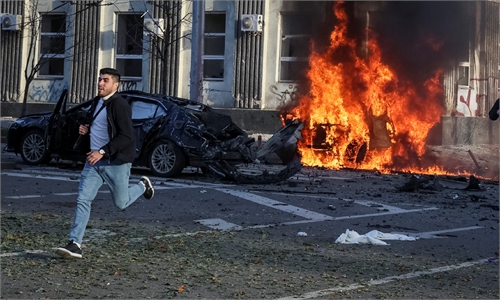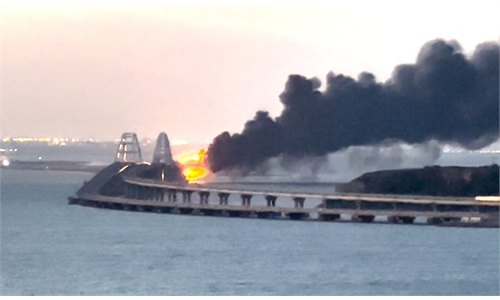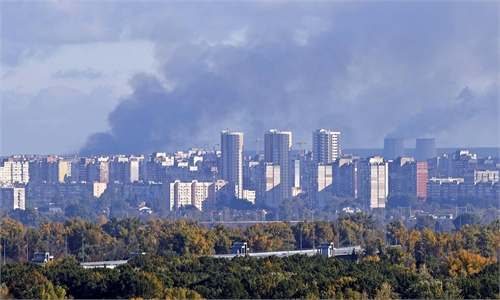G7 to fuel conflict with more military support to Kiev but sustainability of such aids in question
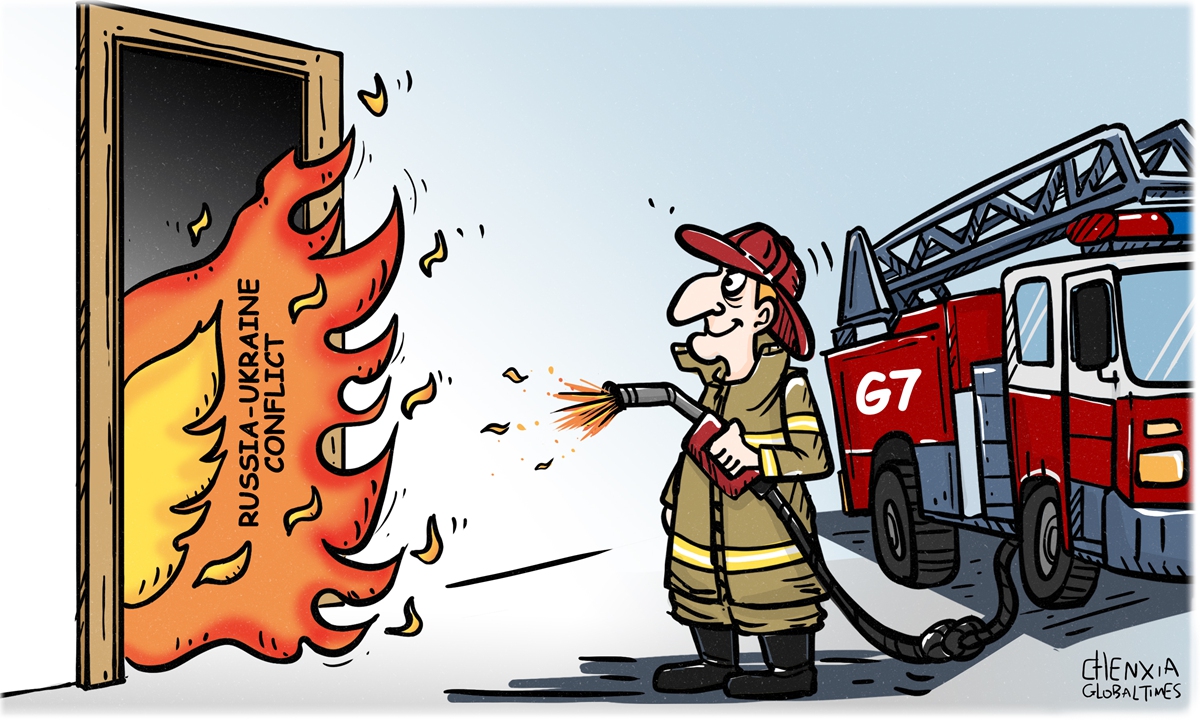
G7 Ukraine Illustration: Chen Xia/GT
Leaders of the Group of Seven (G7) convened a virtual meeting on Tuesday on supporting Ukraine following the escalation of the Russia-Ukraine conflict. Chinese observers believe that the West, eyeing a prolonged proxy war to exhaust Russia, would continue to fan the flames by providing Ukraine with more weapons and should be blamed for the current rising tensions.
Observers also said one key point for the future escalations of the conflict lies in Europe's attitude, and they urged Europe to avoid turning itself into a complete vassal of the US to risk losing independence and undermining its own interests.
US President Joe Biden and G7 leaders held a virtual meeting on Tuesday to discuss their commitment to supporting Ukraine and holding Russia accountable for "aggression," including its recent "missile strikes across Ukraine," Reuters reported. Ukraine's President Volodymyr Zelensky addressed the meeting and asked for help with the creation of an air shield.
The G7 meeting was conducted after Russia launched a large-scale attack against Ukrainian targets on Monday "in retaliation" for a deadly blast on the Crimean Bridge. It also comes amid a looming energy crisis in Europe that has shaken its unity.
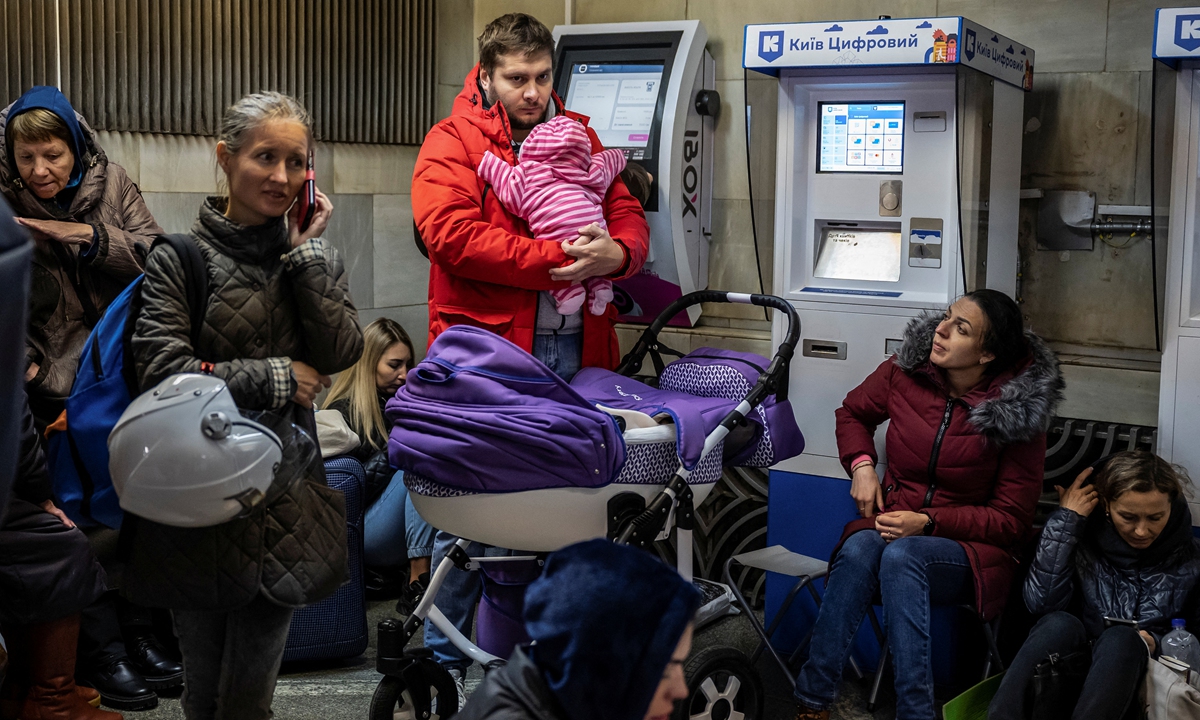
People take shelter inside a subway station from missile attacks in Kiev, Ukraine on October 11, 2022 when sirens sound across Ukrainian cities as Russian strikes continue. Photo: IC
Regarding the escalated tensions of the Russia-Ukraine conflict, Mao Ning, spokesperson of the Chinese Foreign Ministry, said at Tuesday's routine press conference that the ongoing developments are worrisome.She said China calls on relevant parties to find proper ways to address differences through dialogue and consultation, and that China is ready to work with the international community and continue to play a constructive part in de-escalation efforts.
A Beijing-based expert on Russian, Eastern European and Central Asian studies told the Global Times on Tuesday on condition of anonymity that the G7 meeting serves partially to help the US reunite his allies amid emerging cracks between the US and Europe and within Europe with the escalation of Russia-Ukraine conflict as well as the deepening energy crisis.
Meanwhile, the G7 meeting also aims at wearing down Russia with continued military support to Ukraine, the expert said. More military support to Ukraine will also be a response from the West to Russia's attack to Kiev, the expert said.
Chinese observers said the US and the West should be blamed for fueling the already escalated tensions when the pressing task is to call on all parties to cease fire through talks and negotiations.
Cui Heng, an assistant research fellow from the Center for Russian Studies of East China Normal University, told the Global Times on Tuesday that it seemed Europe has been kidnapped by the US and is unable to make decisions based on its own interests.
As for the full meeting of NATO leaders in the coming days, Cui said "condemnation" of Russia is very likely to be the main agenda given there are very limited tools left for the West to sanction Russia.
The above-quoted expert said the West has been actively organizing proxy war, and meanwhile the US has also manipulated Ukraine through an external governance system.
"The system enables the US to use the weakness of the Ukrainian elites against them, while also spreading disinformation in Ukraine," the expert said.
According to Defense News, the US Congress is expected to allocate a total of more than $65 billion aids to Ukraine this year through several aid packages.
The Biden administration's waves of aids to Ukraine have backfired at home as Republicans slammed him for destabilizing the market and "fueling war."
As for the future trend of the Russia-Ukraine conflict, the above-quoted expert said the degree of escalation of the situation in the future depends on Europe's attitude.
The expert believes that Russia's moves aimed at forcing the West - mostly Europe - to change its attitude toward Russia, and Russia played its energy card to pressure Europe so the latter would not turn into a complete vassal of the US.
Possible future scenarios include Europe becoming independent from the US - indicating that Russia and Europe may have dialogue, and Europe splitting with some countries tying themselves to US' chariot and others choosing to communicate with Russia, the expert said.
More military aids
Ahead of the G7 meeting, Biden spoke with Zelensky on Monday, during which Biden pledged to continue providing Ukraine with the support it needed to defend itself, including advanced air defense systems, according to a White House statement on Monday.
TASS reported on Tuesday that Washington's recently announced statements about its readiness to provide Ukraine with additional supplies of military products prove that the US is a part of the conflict, Russian Ambassador to the US Anatoly Antonov stated.
While the White House did not specify which air defense systems Biden had discussed with Zelensky, CNN named the National Advanced Surface-to-Air Missile System (NASAMS) as a possible candidate, which allegedly would be capable of engaging Russian cruise missiles.
From a technical point of view, the air defense systems to be delivered to Ukraine mentioned in media reports indeed have the potential to defend against Russian cruise missiles, because cruise missiles in general fly at slower speeds and at lower altitudes, making them vulnerable targets as long as they are detected, a defense expert who requested anonymity told the Global Times on Tuesday.
Now that NATO is determined to confront Russia by making use of Ukraine, the US and its allies will likely deliver those systems as quickly as possible, the expert said.
Experts believed the US and NATO would send more weapons to Ukraine to further escalate the tensions, but they are unlikely to send any weapons of mass destruction. Meanwhile, NATO members' military stocks are being depleted in a high proportion due to aids to Ukraine, according to media reports.
